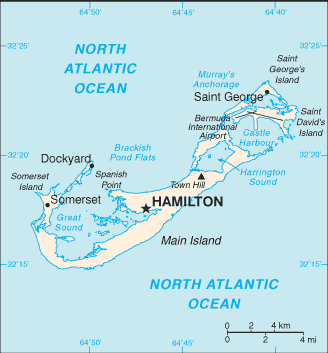|
Bermuda
|

|
Capital: Hamilton
Population: 62,506
Brief History of Bermuda:
Bermuda is a fairly isolated set of islands in the Atlantic Ocean around 650 miles east of the coast of North Carolina. There are seven main islands and several more smaller islands. The main islands are all close enough to be connected by bridges and are usually referred to together as the Island of Bermuda.
The islands were first discovered by Jaun de Bermudez in 1503. Juan was a Spanish explorer and, although the island is named after him he didn't attempt to land on the islands because of the dangerous reef.
Over 100 years later in 1609, George Somers was leading a group of colonists from England when they were shipwrecked on Bermuda. They found the island to be uninhabited. They were stranded there for 10 months. When they returned and told stories of the beautiful island, King James decided to extend the Charter of the Virginia Company to include it in 1612. That same year the city of St. George was founded by the first colonists from England. Today St. George is the oldest continuously inhabited English-speaking settlement in the Western Hemisphere.
In 1620, Bermuda became a self-governing colony. Some slaves were brought to Bermuda at the start. In 1807 the slave trade was abolished and existing slaves were freed in 1834. As a result, over half of Bermuda's current population is of African descent.
The Geography of Bermuda
Total Size: 53 square km
Size Comparison: about one-third the size of Washington, DC
Geographical Coordinates: 32 20 N, 64 45 W
World Region or Continent: North America
General Terrain: low hills separated by fertile depressions
Geographical Low Point: Atlantic Ocean 0 m
Geographical High Point: Town Hill 76 m
Climate: subtropical; mild, humid; gales, strong winds common in winter
Major cities: HAMILTON (capital) 12,000 (2009)
The People of Bermuda
Type of Government: parliamentary; self-governing territory
Languages Spoken: English (official), Portuguese
Independence: none (overseas territory of the UK)
National Holiday: Bermuda Day, 24 May
Nationality: Bermudian(s)
Religions: Anglican 23%, Roman Catholic 15%, African Methodist Episcopal 11%, other Protestant 18%, other 12%, unaffiliated 6%, unspecified 1%, none 14% (2000 census)
National Symbol: red lion
National Anthem or Song: Hail to Bermuda
Economy of Bermuda
Major Industries: international business, tourism, light manufacturing
Agricultural Products: bananas, vegetables, citrus, flowers; dairy products, honey
Natural Resources: limestone, pleasant climate fostering tourism
Major Exports: reexports of pharmaceuticals
Major Imports: clothing, fuels, machinery and transport equipment, construction materials, chemicals, food and live animals
Currency: Bermudian dollar (BMD)
National GDP: $4,500,000,000
** Source for population (2012 est.) and GDP (2011 est.) is CIA World Factbook.
Back to Geography Home Page
